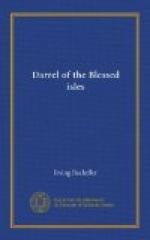“I must see you again,” said the tragedian, rising. “Of those parts I try to play, which do you most like?”
“St. Paul,” said Darrel, quickly. “Last night, sor, in this great theatre, we heard the voice o’ the prophet. Ah, sor, it was like a trumpet on the walls of eternity. I commend to thee the part o’ St. Paul. Next to that—of all thy parts, Lear.”
“Lear?” said Forrest, rising. “I am to play it this autumn. Come, then, to New York. Give me your address, and I’ll send for you.”
“Sor,” said Darrel, thoughtfully, “I can give thee much o’ me love but little o’ me time. Nay, there’d be trouble among the clocks. I’d be ashamed to look them in the face. Nay,—I thank thee,—but I must mind the clocks.”
The great player smiled with amusement.
“Then,” said he, “I shall have to come and see you play your part. Till then, sir, God give you happiness.”
“Once upon a time,” said Darrel, as he held the hand of the player, “a weary traveller came to the gate o’ Heaven, seeking entrance.
“‘What hast thou in thy heart?’ said the good St. Peter.
“‘The record o’ great suffering an’ many prayers,’ said the poor man. ‘I pray thee now, give me the happiness o’ Heaven.’
“‘Good man, we have none to spare,’ said the keeper. ’Heaven hath no happiness but that men bring. It is a gift to God and comes not from Him. Would ye take o’ that we have an’ bring nothing? Nay, go back to thy toil an’ fill thy heart with happiness, an’ bring it to me overflowing. Then shalt thou know the joy o’ paradise. Remember, God giveth counsel, but not happiness.’”
“If I only had your wisdom,” said Forrest, as they parted.
“Ye’d have need o’ more,” the tinker answered.
Trove and Darrel walked to the clearing above Faraway. At a corner on the high hills, where northward they could see smoke and spire of distant villages, each took his way,—one leading to Hillsborough, the other to Allen’s.
“Good-by; an’ when I return I hope to bear the rest o’ thy tale,” said Darrel, as they parted.
“Only God is wise enough to finish it,” said the young man.
“’Well, God help us; ‘tis a world to see,’” Darrel quoted, waving his hand. “If thy heart oppress thee, steer for the Blessed Isles.”
XXI
Robin’s Inn
A big maple sheltered the house of the widow Vaughn. After the noon hour of a summer day its tide of shadow began flowing fathoms deep over house and garden to the near field, where finally it joined the great flood of night. The maple was indeed a robin’s inn at some crossing of the invisible roads of the air. Its green dome towered high above and fell to the gable end of the little house. Its deep and leafy thatch hid every timber of its frame save the rough column. Its trunk was the main beam, each limb a corridor, each tier of limbs a floor, and branch rose above branch like steps in a stairway. Up and down the high dome of the maple were a thousand balconies overlooking the meadow.




